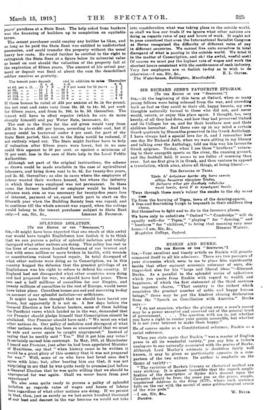SPLENDID ISOLATION.
ITO ERE EDITOR or exe "Specesson.") Sra,—It might have boon expected that one result of this awful war would have taught Englishmen how foolish it is to think that we can pursue a policy of splendid isolation and totally disregard what other nations are doing. This policy has cost us the lives of some eeven hundred thousand of our bravest and hest with some million or more broken in health, with wounds or constitutions ruined beyond repair. In total disregard of what other nations were doing as to Conscription, we in this country hugged the delusion that the greatest privilege of an Englishman was his right to refuse to defend his country. If England had not disregarded what other countries were doing and had prepared for war, we should have bad peace. These two and a half millions of casualties for our Empire, and twenty millions of casualties in the rest of Europe, would never have taken place. Countless homelier." sad and mourning to-day On account of our splendid isolation—or selfishness.
It might have been thought that we should have learnt our lesson, but apparently it is not so. A few days before the General Election a few Labour leaders, some of them holding the Pacifiedet views which landed us in the war. demanded that our Premier should pledge himself that Conscription should be abolished. Our Premier should have said: " We must see what other nations do. Our policy of isolation and disregard of what other nations were doing has been so unsueceseful that we must he safe and never again be caught unprepared." Instead of saying that he meekly said " Yes." Did it get him any votes It certainly earned him contempt. In May, 1915, at Mancheeter I heard our Premier. just after he had been appointed Minister of Munitions, say that "when history came to be written it world be a great glory of this wimpy that it was not prepared for war." Well, some of as who have lost loved ones don't agree with him; but, after hearing him say that, it was not surprising to sea that he Was quite ready to premise just before a General Election that he was quite willing that we ehould be unprepared for war again. Shall we never learn from past experience?
We also seem quite ready to pursue a policy of splendid isolation as regards rates of wages and hours of labour hate regardless of what other nations are doing. If we persist th that, then. just as surely as we lost seven hundred thousand 07 our beet and dearest in the war because we would not take into consideration what 'wee taking plses in the outside world, so shall we lose our trade if we ignore what other nations are doing as regards rates of pay and hours of work. It ought not to pees unnoticed that even the International Socialist Congress at Berne recognised the diffioulty of different rates of pay in different countries. We cannot live unto ourselves in total disregard of what ie passing in the outside world. We tried It in the matter of Conscription, and oh! the awful, woeful corn Of course we must pay the highest rate of wage, and work the shortest hours consistent with the continuance of each industry. Very few employers are so foolish to-day as to wish to do
otherwise.—I am, Sir, Aso., E. L. WEIL The Waterhouse, Bollington, Macclesfield.






































 Previous page
Previous page